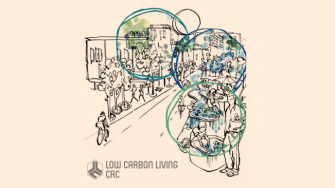Program 3: Engaged Communities

This project builds on previous CRCLCL research (RP3010) and aims to facilitate broader uptake and mainstreaming of the prototype Low Carbon Schools program piloted in Western Australia in 2016/17. Funding will be used to identify and recruit a minimum of 100 schools for a national launch of the program in 2018.
The 2018 program is being refined and optimised based on the current pilot to create an online, scalable, standardised and systematic approach to enable schools nationwide to measure, monitor and reduce their emissions, with the aim to achieve carbon neutrality. It will test innovative new software that uses predictive data analytics to assist schools in decision-making and implementation of low carbon initiatives.
The initial CRCLCL-funded scoping study followed the success of the first case study school, South Fremantle Senior High School in WA - which became the first carbon neutral school in Australia. The research then expanded to track the development, implementation and impact of the current pilot with 15 schools in WA, with a focus on community influence.
This program, which is now expanding again to work with 100 schools nationally, aims to demonstrate how such a program can be mainstreamed and widely adopted. It will also encourage the families of the students in participating schools to use the online tool in their homes to calculate and manage their household carbon footprint. This will be tracked alongside the schools to document the impact the school is having on the community.
Dr Vanessa Rauland
Complete
08/2017 to 06/2018
- Publications
- Posters
- News
- Partners
Peer Reviewed Research Publications
RP3020u1: Report: National Survey Results on Attitudes Toward the Role of the Built Environment and Sustainability on Learning Outcomes
This report presents findings of a survey of 120 people across Australia who are connected to schools, and examines their beliefs, attitudes and experiences relating to the impact of the built environment on health and learning outcomes in schools. It also examines the uptake of sustainability and carbon emissions reduction programs in schools, and attitudes and behaviours toward low carbon living in the household.
lcl crc report low carbon built environment schools survey 2019 final 1 (1382994 PDF)
CRCLCL Annual Reports
RP3020u1: Report: National Survey Results on Attitudes Toward the Role of the Built Environment and Sustainability on Learning Outcomes
This report presents findings of a survey of 120 people across Australia who are connected to schools, and examines their beliefs, attitudes and experiences relating to the impact of the built environment on health and learning outcomes in schools. It also examines the uptake of sustainability and carbon emissions reduction programs in schools, and attitudes and behaviours toward low carbon living in the household.
lcl crc report low carbon built environment schools survey 2019 final 1 (1382994 PDF)
CRCLC Project Reports
RP3020: Report: Carbon Tools & Frameworks for Institutional Precincts Stage 1: Low Carbon, High Performance Schools
The following report presents the results of research conducted on how to best deliver low carbon, high performance schools in the Australian context.
The term ‘high performance’ was used to reflect the increased performance in both the buildings and physical infrastructure of schools that pursue sustainability, as well as improved academic performance due to the increased health and productivity benefits associated with better buildings and facilities.
The research included a literature review, two workshops and a survey with teachers and other stakeholders affiliated with schools. The report addresses the following areas:
- Key benefits and opportunities for schools to improve their overall performance by pursuing carbon reduction;
- Key issues, challenges and problems facing schools attempting to reduce their emissions, and what additional processes, resources and assistance schools need to help them actively measure, monitor and reduce their carbon footprint;
- Opportunities to develop carbon performance benchmarks and targets for schools;
- Identification and categorisation of the existing school sustainability programs in Australia, with a primary focus on carbon;
- Evaluation of the tools in terms of their ability to quantitatively assess and reduce emissions at the school level;
- Identification of pathways to create a standardised framework and system for schools seeking carbon neutrality.
The report is written for anybody working with schools, including teachers, admin and school support staff, Education Departments, academics, professionals, parents and the general public. The report aims to highlight the multiple reasons for pursuing carbon reduction, and provide some ideas and incentives to encourage greater uptake.
RP3020 Stage 1 report : Low Carbon, High Performance Schools (5589270 PDF)
CRCLCL Project Posters
Student Poster 2017: RP3020 - INFLUENCING CHANGE THROUGH A LOW CARBON SCHOOLS PROGRAM
Portia Odell: Student Poster 2017 - RP3020 (377695 PDF)
Student Poster 2015: RP3020e1 Influencing change through a low carbon schools community program
Student Poster – Participants Annual Forum 2015 – Hulya Gilbert
Child friendly precinct design for low carbon living: improving policies and decision making tools
Hulya Gilbert Student Poster 2015 RP3020e1 (356830 PDF)
News article
Survey confirms Australian schools fail to track energy use
13 February 2019
With ‘back to school’ now a done deal, a national survey, opens in a new window has revealed the significant potential to save energy and money in Australian schools goes largely untapped, yet the will for action is strong – with children found to be low carbon living influencers at home. Funded by the CRC for Low Carbon Living, opens in a new window (CRCLCL), the survey examined the attitudes and experiences of 120 people connected to schools and their beliefs around the built environment’s impact on health and learning.